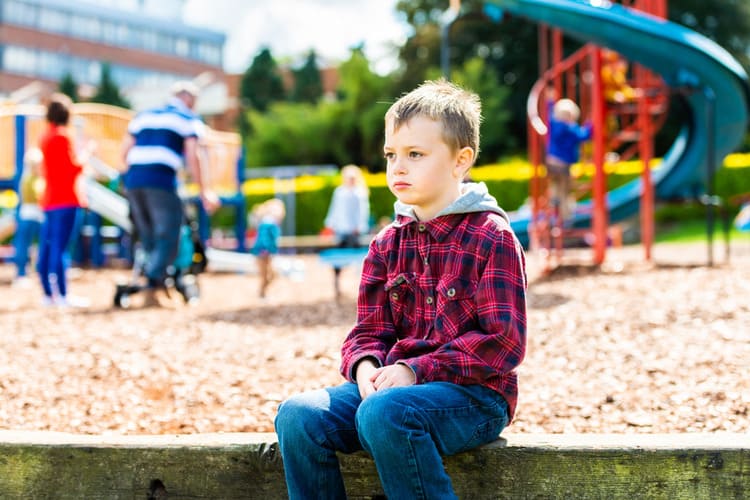
Asperger's syndrome and its first manifestations in children
Asperger's syndrome belongs to a wide spectrum of autistic disorders. It is manifested by disorders of behavior, social interactions and communication, which led people to adopt a new lay name for this disease, namely "social dyslexia". People with Asperger's syndrome basically cannot read the feelings and behavior of people around them, which is reflected in their inability to understand our normal social life. The result is that such a child withdraws into his own world. There, no social interaction is expected of him with the outside world, which is often "strange" for him.
What exactly is the essence of this genetic anomaly, as well as Asperger's syndrome tests and its manifestations, we will discuss in the following paragraphs. We did not forget to summarize very important and practical advice for parents with children affected by Asperger's syndrome.
What is Asperger's syndrome?
Asperger's syndrome can be characterized as milder autism with intact intelligence, which ranges from normal to high levels. This type of autism is specific with certain features that have a significant impact on the normal life of both an adult and a child with this diagnosis.
Manifestations of Asperger's syndrome affect mainly the context of the individual's behavior and communication, while from the point of view of the intelligence quotient, he could lead a completely normal life like any other healthy person, but it is precisely the deviations from normal behavior that often cause a person with Asperger's to be singled out from the collective. As a result of such actions of society, such a person closes himself off even more from the environment and a certain communicative passivity towards the world and society arises within him.
From the point of view of statistics, boys are more often affected by Asperger's syndrome, in a ratio of 4:1, but more and more in terms of gender differences, the theory that this disease appears in girls only at a later stage of life is being considered. However, an explanation is also possible that describes the ability of girls to pick up the basic norms of social behavior more quickly, which leads to a perfect hiding of Asperger's. However, the problem with this genetic disease is much more reflected in girls' withdrawal and their susceptibility to depression.
The disorder has been present since early childhood, but at that time it is very difficult to diagnose. Over time, it permeates the child's entire personality and significantly affects his thoughts, emotional expressions, but also communication skills. This genetic anomaly in the right cerebral hemisphere is still incurable nowadays, so children with Asperger's have to go through their lives with all the complications that this disease brings. The quality of life with Asperger's can be greatly influenced by proper upbringing and sufficient education in social interaction and natural human communication.
The impossibility of treatment may also be related to the fact that the true cause of this genetic anomaly cannot be determined with certainty. Despite everything, people with this disorder can lead full lives, but careful and careful monitoring of their behavior is especially necessary during puberty, when isolation and loneliness have a huge impact on a child with Asperger's. Unpleasant feelings, isolation and frequent bullying or ridicule by peers can very easily lead them to make fatal decisions.

Asperger syndrome and its symptoms
The manifestations of Asperger's syndrome are in any case very individual, even if they generally refer mainly to the communication and behavioral aspects of a person, while the main symptoms are, in addition to intelligence, very indistinct and difficult to detect, which naturally complicates early diagnosis, especially in children who are in the early stages of education process. Sometimes Asperger's syndrome remains "secret" forever, in some cases it is only discovered and confirmed years later.
Disorders of social interaction
Children with Asperger's syndrome often prefer and of their own free will choose solitude, the cause of which in most cases is their inability to understand and correctly perceive the behavior, gestures, facial expressions and other expressions of their own peers. This leads them to regret their difference compared to other children and the subsequent sadness, feeling of helplessness and abandonment. Even if they make an extra effort to fit in, it is very difficult for them, because they are literally fighting with the outside world, which is simply incomprehensible to them.
The difference between Asperger's syndrome and other types of autism is that children with Asperger's literally crave company, but their negative experiences discourage them from fulfilling this desire. The more negative and unpleasant feelings and experiences they experience from contact with society, the more they close in on themselves, and this situation can hardly be reversed. People with Asperger's syndrome often also struggle with various phobias of social contact, places with a high concentration of people, touching, criticism, but also solitude, closed spaces or other people's taunts at their expense.
Since such children cannot maintain friendships and may even experience ridicule and bullying from other classmates at school, the only safe "place" for them often becomes one of their parents. The fact that while children with Asperger's syndrome prefer the company of adults, after reaching adulthood, this aspect of their life is turned around and they seek out a children's collective.

Disorders of social aspects of communication with the environment
From a communication point of view, it is more about difficulties in establishing and maintaining contact than problems with speech or vocabulary. In most cases, the speech and the dictionary are perfectly embellished. The problem comes when their fear of interactions kicks in. In this way, already in the early stages of childhood, the child loses the opportunity to establish friendly relationships, which leads him to be aloof. The more the child realizes his difference from the rest of his peers, the more he is drawn to complete isolation from the surrounding world. This is also why it may seem to society that these children are stupid, while in many cases the opposite is true.
It is indeed understandable that ordinary people encounter obstacles in trying to figure out the right way to communicate with a person with Asperger's. In a conversation, people with Asperger's syndrome encounter misunderstanding from those around them, as they often jump into others' conversations, talk about topics that may not be of interest to anyone from the team, while they absolutely ignore the other party's reactions indicating dissatisfaction with the situation. Such people then basically conduct lengthy monologues about topics that only interest them, without looking at others. The length of their speech is also accompanied by other characteristic factors, such as the monotony of speech or averting their eyes during communication.
People with Asperger's syndrome also have a problem with the usual expression of affection in verbal and non-verbal form. It could be concluded that the cause can be found in their exaggerated logical and rational understanding of the world. And this at the expense of the necessary empathy and emotionality for ordinary people, which can also lead to the complete isolation of the child and parents from the extended family or residents of the street and housing estate, who may not have enough understanding of the circumstances of Asperger's syndrome. This may be mainly due to the fact that children with Asperger's appear to be completely normal children without any problems due to normal to above average intelligence, which is not true in most cases. An autistic disease like Asperger's syndrome can be understood as a compulsion for logical and scientific understanding of ordinary things that ordinary people can understand through their own intuitions.
Another problem that people with Asperger syndrome have to swallow are ambiguous phrases, jokes or sarcasm. These aspects of normal communication do not play a role in their lives, because they often take such verbal turns literally, so they may not understand the original intention of the other party who uttered the given ambiguity at all. Even such misunderstandings can lead to a feeling of inferiority and difference from the rest of the team.

Disorders of perception and imagination in children with Asperger's syndrome
The excessive rationality of children with Asperger's syndrome does not end only with jokes and sarcasm. It is also transferred to their faulty perception of abstract things and insufficient imagination, which literally flourishes among their peers during childhood. Children with this autistic disease excel in mathematics and other logically progressive school subjects, but they have problems with abstract subjects such as art education, religion or military exercises.
Asperger's syndrome in children and the essence of maintaining a routine
It is very important that a child with Asperger's syndrome stays in his/her usual routine, because upsetting him/her by changing the usual routine can lead to depression, crying and anxiety states. In newborns or small babies, Asperger's syndrome can manifest itself during the sleep routine, when the child is used to one toy with which he always falls asleep. If you suddenly change this toy, this action can lead to irritation and intense expressions of dissatisfaction on the part of the child.
Older children with Asperger's also need to follow a certain, predetermined schedule, and deviation from it can lead to feelings of sadness and discomfort. For ordinary people, only certain drastic changes are stressful, but imagine what it would be like for you if you suffered from excessive nervousness and stress every time your plans changed even a little.

How is Asperger's syndrome diagnosed?
Children with Asperger's grow up just like any other child without a genetic anomaly, so detecting and establishing the right diagnosis at that time is very difficult. The first manifestations of Asperger's syndrome can be observed in kindergarten, that is, in preschool age, when the child finds himself in a larger group for the first time. However, even these may not fully lead to a positive diagnosis of Asperger's syndrome.
For the final determination of Asperger's syndrome in children, long-term monitoring of possible disorders belonging to the above-mentioned triad including disorders of social interaction, social aspects of communication with the environment, and disorders of perception and imagination is necessary. Sometimes this anamnesis lasts for years, while on average the age of diagnosis of Asperger's syndrome is at the beginning of puberty, more precisely in the 11th year of the child's life.
If you observe certain signs similar to Asperger's syndrome in your child, such as isolation in a group, atypical behavior or difficulties in understanding the world around you, it is advisable to visit a general practitioner, to whom you need to describe a detailed lay history, which you compiled yourself based on the observed behavior of the child. Finding a psychologist is the next step towards a correct diagnosis of the problem your child is suffering from. After completing several sessions, which also include tests for Asperger's syndrome consisting in the examination of individual behavioral and communication manifestations, he can establish a diagnosis, or to confirm or refute your suspicion of Asperger's syndrome.
Also helpful is the so-called SPECT (single photon emission computed tomography) examination, which consists of three-dimensional spatial imaging of the brain or other examined organ, while it is also possible to view it in individual sections, which enables a more detailed analysis of the problem, as well as the possible finding of a brain defect characteristic of any of the autism spectrum disorders. It is interesting that people with Asperger's syndrome have a different structure of the cerebral hemispheres than a healthy individual, and this difference can be observed thanks to the medical examination described above.

Treatment of Asperger syndrome
As we have already mentioned above, the treatment of Asperger's syndrome is impossible, and the fight against such an autistic disease is not helped by the fact that it is very difficult to detect. However, if a specialist has confirmed it in your child, there is definitely no need to despair. It is necessary to arm yourself with a sufficient supply of patience and determination.
Your role as a parent is very important in the eyes of a child with Asperger's syndrome, especially because of the aforementioned above-standard attachment of the child to one of the parents. The child considers him a safe place and an authority that can help him step by step to acquire a full life with normal social interactions and proper communication after an early diagnosis of Asperger's. For such children, it is even more important to remember what and when it is appropriate to say in society and when establishing communication.
The mentioned problem with imagination may not apply to every child. There are known cases of people with Asperger's becoming writers, artists, poets or scientists and Nobel Prize winners. In this regard, their exclusive obsession with one topic, which can motivate them for future success in the given field, is also a great advantage.
The most important factor, apart from the parent, is an experienced specialist in Asperger's syndrome, most often a psychologist with sufficient experience with autistic diseases, who can establish a positive relationship with your child, which can lead to huge progress in the fight against the typical manifestations of Asperger's syndrome. A doctor and a psychologist are also suitable advisers in the matter of choosing the right educational institution for your child. Their expert eye can assess whether it is necessary to look for a specialized private school or whether it is safe and appropriate for your child to stay at the original school.
While there is no comprehensive treatment for Asperger's syndrome, it is possible to alleviate its manifestations, which can help the child, and in the future, the adult, to fit into society. Tolerance towards people with Asperger's syndrome, but also other types of autism, which are often manifested by unnatural behavior, is an essential step towards the inclusion of such people in the collective.
Experiences
The mothers confirmed in the discussions that children with Asperger's syndrome are often misunderstood by those around them. They tend to be explosive to aggressive or, on the contrary, quiet and shy. They do not want to contact other children and are afraid of unpredictable situations. Moms advise to approach the child with patience, because the child with Asperger observes and learns from different situations. At the first suspicion of this syndrome, they recommend a visit to a doctor, who will refute or confirm the diagnosis. This is the best way to find out what the problem is and how to approach the child.
The most frequent questions - FAQ
Are you also interested in other aspects related to Asperger's syndrome and its manifestations? Can you think of other questions that were not answered in the text of the article or in the question and answer section? Feel free to put them in the comments below the article. We will try to answer them as soon as possible.
Is it natural for children with Asperger's syndrome to be hypersensitive?
Do children with Asperger's have hobbies?
Do children with Asperger's syndrome tend to be perfectionists?
Pridať komentár





